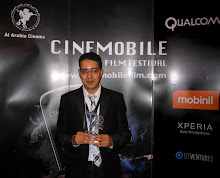أعلنت دوك ميد الممول من الأوروميد السمعي البصري عن أسماء
المشتركين الذين تم إختيار مشاريعهم لمتابعة الدورة الثالثة من البرنامج. و
هو برنامج تدريبي قائم على المشاريع ويتناول الإنتاج الدولي المشترك
للأفلام الوثائقية المستقلّة. يتوجّه دوك ميد إلى المنتجين والمخرجين
المنتجين في البلدان العربية المتوسطية الذين يطوّرون مشاريع طموحة على
المستوى الدولي وذلك من خلال ثلاث جلسات تمكنهم العمل بطريقة مثلى في
مجالات إنتاج الأفلام الوثائقية والإبداع والتمويل والتكنولوجيا.
هذا العام 61 مشروعا تقدّم للمشاركة ولكن تم اختيار مجموعة تضمّ ١٠ مشاريع فقط كل من مصر, المغرب, ليبيا, تونس, الجزائر و سوريا.
أما المشاريع وأسماء المشتركين فهم:
- ظريفا والحيتان الوحيدان - الجزائر - إخراج ظريفا مزنر إنتاج بوعلام زياني
- النسور الصغيرة - مصر - إخراج محمد رشاد إنتاج هالة لطفي
- مكان تحت الشمس - المغرب - إنتاج وإخراج: كريم أيتونة
- بابا والعقيد - ليبيا - إنتاج وإخراج: خالد شميص
- حرية - مصر - إنتاج وإخراج علاء مصباح
- السماء فوق الإسكندرية - مصر - إنتاج وإخراج أحمد رشوان
- لدي صورة - مصر - إنتاج مارك لطفي إخراج محمد زيدان
- شارع الأمين- سوريا - إنتاج وإخراج مايا منيّر
- في العمق الرمادي - مصر - إنتاج وإخراج منى لطفي
- ملهى ويكي - تونس - إنتاج أسماء شيبوب إخراج وليد الطايع
إن الجلسة الأولى التي تركز على تحليل جهة الكتابة و عملية تطور المشروع ستبدأ من 18 إلى 24 أذار/مارس في لبنان.
هذا البرنامج من تنفيذ:
- بيروت دي سي (لبنان) توفّر الدعم والمساعدة للسينمائيين المستقّلين في العالم العربي من خلال التدريب والترويج والمشاركة في الانتاج منذ سنة ١٩٩٩.
- أورو دوك (فرنسا) تساهم منذ اكثر من ١٠ سنوات، في التدريب والتشبيك بين المنتجين والمموّلين الاوروبيين لتطوير مشاريع وثائقية وتحقيقها.
- دوك أتونيس (تونس) مهرجانًا للأفلام الوثائقية يقدم مجموعة واسعة من الأفلام الدولية التي تتناول قضايا هامة.
بالتعاون مع شريك وهو آرتيه فرنسا.
الخبر على موقع الاتحاد الأوروبى
Ten documentary projects selected for DOCmed 2013
Documentary training programme to kick off at the end of March in Lebanon
DOCmed, a Euromed Audiovisual-funded training programme for documentary producers, has announced the names of participants for its third session.
The programme aims to help producers and director-producers from Arabic-speaking countries in the South Mediterranean region to work on their creative documentary projects towards their international co-production.
During three training sessions, DOCmed allows them to optimise their performance in documentary production, creation, financing, and using the latest technologies.
This year, ten projects from Egypt, Morocco, Libya, Tunisia, Algeria and Syria were chosen from 61 documentary projects submitted:
- Drifa and the lonely whales, directed by Drifa Mezenner and produced by Boualem Ziani (Algeria)
- Little Eagles, directed by Mohamed Rashad and produced by Hala Lotfy (Egypt)
- Une place sous le soleil (lit. “A place under the sun”), directed and produced by Karim Aitouna (Morocco)
- Baba and the Colonel, directed and produced by Khalid Shamis (Libya)
- Freedom (Horya), directed and produced by Alaa Mosbah (Egypt)
- The sky above Alexandria, directed and produced by Ahmed Rashwan (Egypt)
- I have a Picture, directed by Mohamed Zedan and produced by Mark Lotfy (Egypt)
- Rue Al Amine (lit. “El Amine Street”), directed and produced by Maya Mounayar (Syria)
- In Grey Depth, directed and produced by Mona Lotfy (Egypt)
- Chez Wéki, directed by Walid Tayaa and produced by Asma Chibour (Tunisia)
The first session, to focus on the analysis of participants’ projects in terms of writing and development, is to take place from March 18 to 24 in Lebanon.
DOCmed is a programme initiated by:
- Beirut DC (Lebanon), a Lebanese cultural association that aims to provide help and support to independent Arab filmmakers, in facing and overcoming the constraints to independent-minded Arab cinema.
- Eurodoc (France), a training programme designed for European documentary film professionals who are developing a specific project.
- Doc à Tunis (Tunisia), a documentary film festival.
In association with Arte France, the European cultural television channel.

